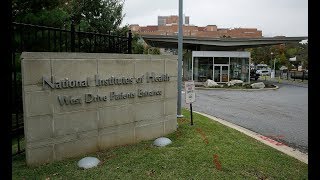(单词翻译:单击)
听力文本
Hari Sreenivasan: The National Institutes of Health held events in seven cities and online today, all to sign up one million Americans who will voluntarily share personal medical information. The project is called "All of Us," and it is raising privacy concerns, but among the ambitious goals: To expand the use of precision genetic medicine and to include more minorities and women, traditionally underrepresented groups in medical research. Joining me now from Washington, D.C. is Lenny Bernstein who is covering the story for the "Washington Post." Give us an idea of how big this project is and what they’re trying to accomplish.
Lenny Bernstein: Sure. This project is probably the most ambitious effort to compile a repository of medical data that’s ever been undertaken. They want a million people to give them various forms of information, everything from filling out a survey to allowing them to sequence your entire genome. And they want people from all walks of life, all over the country, from different racial groups, ethnic groups and they’re taking all kinds of steps to make sure they get it.
Hari Sreenivasan: So what happens with that information once they get it, what are the applications, what are the uses, what do they hope they can get from that?
Lenny Bernstein: The applications are sort of endless at this point. The idea is to foster the growth of precision medicine, and precision medicine is tailoring therapies, but also preventions and cures hopefully to your particular set of needs. So the idea would be that we would have this giant repository of information that various researchers could delve into and examine and use to come up with approaches to all kinds of diseases. It is most easily understood right now in terms of cancer. But maybe we’ll discover something about asthma or maybe we’ll discover something about Parkinson’s disease that we never knew before we could examine all this data.
Hari Sreenivasan: In the wake of the Cambridge Analytica scandal that Facebook is facing and other data breaches all over the country and the world,how does the N.I.H. and the U.S. government plan to protect the information that perhaps a million people will give them?
Lenny Bernstein: From the examples that you just mentioned, we know that nothing is completely safe. Everything can be hacked. However, they have taken extraordinary precautions to protect this, in their reservoirs of data. They also are assuring you that it can never be used in a law enforcement situation. It can never be used in a judicial situation. They-- congress passed a law, with the eye towards this database of-- and they’ve included these certificates of confidentiality. So no matter what happens, even if the information goes online illegally, law enforcement can’t use it.
Hari Sreenivasan: So this is just weeks after the golden state killer was caught using D.N.A. evidence right?
Lenny Bernstein: It is. And I think that that is where people are going to have to make their own decisions. It’s really going to be a personal kind of situation. Some people say to themselves, I give away more information to Facebook every single day and what do I get for it? Nothing. I get ads and I get to be on Facebook. So if they want my whole genome and they want to give me back the result that may be worth it. Other people might say, you know, we’re talking about my electronic medical records, we’re talking about my genome, we’re talking about my activities, we’re talking about my environment and I’m just going to err on the side of caution and not go for it.
Hari Sreenivasan: Is there any assurance that the U.S. government’s going to give that says we are not going to share this information with any third party, no sort of private corporations or grant institutions that want to have a little peek even at the aggregate sets of data even if it’s anonymous?
Lenny Bernstein: I think that would defeat the purpose. I think those certificates of confidentiality and the protections that were put in place by the U.S. congress are supposed to keep that from happening. This is supposed to be information that’s available to researchers and to the people who participate.
Hari Sreenivasan: All right, Lenny Bernstein of the "Washington Post," thank you so much.
Lenny Bernstein: Thank you.
重点解析
1.sign up 签约
He signed up as a steward with P&O Lines.
他签约了P&O航运公司,成为了一名乘务员。
2.come up with 想出
Several of the members have come up with suggestions of their own.
有几位成员提出了自己的建议。
3.in the wake of 紧随
In the wake of developments in science and technology, man has become more capable of conquering nature.
随着科学技术的发展,人们征服自然的能力也越来越强了。
4.give away 捐赠
He was giving his collection away for nothing.
他将收藏品无偿捐献出来。
5.on the side of 站在一边
Some of the younger people seem to be on the side of reform.
一些年轻点的人似乎赞同改革。
参考译文
哈里·斯雷尼瓦桑:今天美国国立卫生研究院在七座城市举行签愿活动,希望召集一百万名美国人签署协议,承诺自愿分享个人医疗信息。线上活动同期举行。这个项目名为“All of Us”,此举引发了人们对隐私问题的关注,但其中一些目标颇具雄心:包括扩大精密遗传医学应用,以及扩大少数民族及妇女,这些传统上代表性不足的群体,在医学领域的研究。《华盛顿邮报》负责此事报道的记者伦尼·伯恩斯坦从华盛顿特区与我们连线。请告诉我们这个项目的规模以及目标。
伦尼·伯恩斯坦:好的。汇编医疗数据库这一项目极具挑战性,这也是我们从来没有做过的。他们希望能有一百万人给他们提供各种形式的信息,包括填写调查问卷,以及允许他们对你的整个基因组进行排序。他们希望争取来自全国各行各业,不同种族民族的人,他们采取各种步骤,确保他们能够得到。
哈里·斯雷尼瓦桑:那么一旦他们得到了这些信息,会做什么,有什么应用,有什么用途,他们希望能从中得到什么?
伦尼·伯恩斯坦:在这一点上可以说,应用永无止境。这个想法是为了促进精密医学发展,而精密医学可以为人们提供个性化的治疗方案,同时希望可以帮助人们提供预防和治疗,满足人们特定需求。
所以我们的想法是,我们将拥有一个巨大的信息库,各种各样的研究人员都可以深入研究,利用这个信息库,寻求各种疾病的治疗方法。就癌症而言,目前最容易理解。但也许我们会发现关于哮喘,会发现关于帕金森病的一些以前我们从不知晓的线索,我们可以对所有这些数据进行检查。
哈里·斯雷尼瓦桑:Cambridge Analytica丑闻刚过,脸谱网又发生全国乃至全球的数据泄露丑闻,N.I.H.和美国政府计划如何保护这可能有一百万人的信息?
伦尼·伯恩斯坦:通过你刚才提到的例子,我们知道没有什么是绝对安全的。一切都可能遭到黑客攻击。然而,他们采取了特殊的预防措施来保护这一点。他们也向你保证,绝不将其用于执法。也决不用于任何司法场合。他们——国会通过了一项法律,着眼于这个数据库——他们已经将这些保密文件囊括在内。所以不管发生什么,即使信息非法流到网上,执法层面也无法使用。
哈里·斯雷尼瓦桑:所以就在几周前,“金州杀手”的落网正是利用了D.N.A.证据,对吧?
伦尼·伯恩斯坦:是的。我认为这就是人们必须要自己做出决定的地方。完全看个人了。有些人对自己说,我每天为脸谱网上传更多信息,我能从中得到什么?什么也得不到。我得到的是广告,还得上脸谱网。所以,如果他们想要我的全部基因组,他们想把结果返回给我,那可能还值得。
其他人可能会说,我们在谈论我的电子病历,我们在谈论我的基因组,我们谈论的是我的活动,我们谈论的是我的环境,我只是在谨慎地犯错,不要去做。美国政府会不会给我们任何保证,说我们不打算将这个信息分享给任何觊觎这些数据的第三方,私人公司或资助机构,即使是匿名的?
伦尼·伯恩斯坦:我认为这会挫败目标。我认为这些保密文件和美国国会所采取的保护措施应该能防止这种情况的发生。这应该是研究人员和参与的人所能得到的信息。
哈里·斯雷尼瓦桑:好的,《华盛顿邮报》的伦尼·伯恩斯坦,非常感谢你。
伦尼·伯恩斯坦:谢谢你。
译文为可可英语翻译,未经授权请勿转载!


